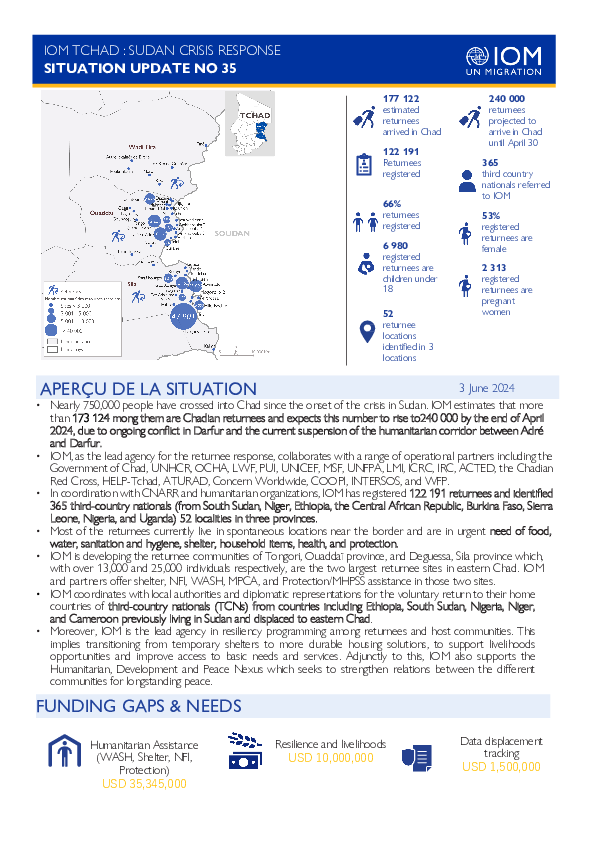-
Countries
-
Data and Analysis
-
Special Focus
-
Crisis Responses
Chad — Sudan crisis response: Situation update 35 (3 June 2024)

Contacter
DTM Chad, dtmtchad@iom.int
Langue
English
Emplacement
Chad
Snapshot Date
Jun 03 2024
Activité
- Mobility Tracking
- Event Tracking
• Nearly 750,000 people have crossed into Chad since the onset of the crisis in Sudan. IOM estimates that more than 173 124 mong them are Chadian returnees and expects this number to rise to240 000 by the end of April 2024, due to ongoing conflict in Darfur and the current suspension of the humanitarian corridor between Adré and Darfur.
• IOM, as the lead agency for the returnee response, collaborates with a range of operational partners including the Government of Chad, UNHCR, OCHA, LWF, PUI, UNICEF, MSF, UNFPA, LMI, ICRC, IRC, ACTED, the Chadian Red Cross, HELP-Tchad, ATURAD, Concern Worldwide, COOPI, INTERSOS, and WFP.
• In coordination with CNARR and humanitarian organizations, IOM has registered 122 191 returnees and identified 365 third-country nationals (from South Sudan, Niger, Ethiopia, the Central African Republic, Burkina Faso, Sierra Leone, Nigeria, and Uganda) 52 localities in three provinces.
• Most of the returnees currently live in spontaneous locations near the border and are in urgent need of food, water, sanitation and hygiene, shelter, household items, health, and protection.
• IOM is developing the returnee communities of Tongori, Ouaddaï province, and Deguessa, Sila province which, with over 13,000 and 25,000 individuals respectively, are the two largest returnee sites in eastern Chad. IOM and partners offer shelter, NFI, WASH, MPCA, and Protection/MHPSS assistance in those two sites.
• IOM coordinates with local authorities and diplomatic representations for the voluntary return to their home countries of third-country nationals (TCNs) from countries including Ethiopia, South Sudan, Nigeria, Niger, and Cameroon previously living in Sudan and displaced to eastern Chad.
• Moreover, IOM is the lead agency in resiliency programming among returnees and host communities. This implies transitioning from temporary shelters to more durable housing solutions, to support livelihoods opportunities and improve access to basic needs and services. Adjunctly to this, IOM also supports the Humanitarian, Development and Peace Nexus which seeks to strengthen relations between the different communities for longstanding peace.
